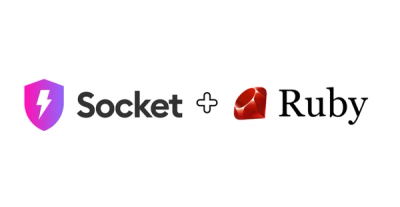
Product
Rubygems Ecosystem Support Now Generally Available
Socket's Rubygems ecosystem support is moving from beta to GA, featuring enhanced security scanning to detect supply chain threats beyond traditional CVEs in your Ruby dependencies.
deflateSync and deflate
zlib)0.13KB / 0.17KBinflateSync and inflate
Uint8Array and TextDecoder)3.16KB / 3.62KBcompress / decompress
1.75KB / 1.67KBcreateScriptLoader
npm install lz-utils
import {
compress, decompress,
deflateSync, deflate,
inflateSync, inflate
} from 'lz-utils';
const raw = "this is string";
const cs = compress(raw);
const ds = decompress(cs);
html reports to users or customers, so the report needs to be generated as fast as possible and the file size should be as small as possible.self-decompressed and rendered in the browser. So that's why inflate browser only.base64? First of all, the data is stored in JSON format, which is easily serialized and compressed. At this time, we get binary data. Although its size is the smallest, it has many problems, such as security issues (CORS) because it is not JS type or object, so we need to convert binary data into JS string, and base64 is a good choice.2.1.0
createScriptLoader2.0.2
2.0.0
1.0.7
1.0.5
FAQs
lz-utils
The npm package lz-utils receives a total of 266,399 weekly downloads. As such, lz-utils popularity was classified as popular.
We found that lz-utils demonstrated a healthy version release cadence and project activity because the last version was released less than a year ago. It has 1 open source maintainer collaborating on the project.
Did you know?

Socket for GitHub automatically highlights issues in each pull request and monitors the health of all your open source dependencies. Discover the contents of your packages and block harmful activity before you install or update your dependencies.

Product
Socket's Rubygems ecosystem support is moving from beta to GA, featuring enhanced security scanning to detect supply chain threats beyond traditional CVEs in your Ruby dependencies.

Research
The Socket Research Team investigates a malicious npm package that appears to be an Advcash integration but triggers a reverse shell during payment success, targeting servers handling transactions.

Security Fundamentals
The Socket Threat Research Team uncovers how threat actors weaponize shell techniques across npm, PyPI, and Go ecosystems to maintain persistence and exfiltrate data.